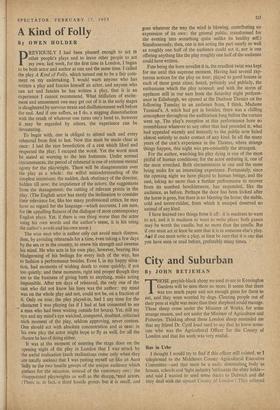A Kind of Folly
By OWEN HOLDER pREVIOUSLY I had been pleased enough to act in other people's plays and to leave other people to act my own; last week, for the first time in London, I began to be both actor and author at one and the same time. I called the play A Kind of Folly, which turned out to be a fair com- ment on my undertaking. 'I would warn anyone who has written a play and fancies himself an actor, and anyone who can act and fancies he has written a play, that it is an experience I cannot recommend. What titillation of excite• mcnt and amusement one may get out of it in the early stages is slaughtered by nervous strain and disillusionment well before the end. And if one suffers, as I do, a nagging dissatisfaction with the result of whatever one turns one's hand to, however it may be regarded by others, the experience can be devastating.
To begin with, one is obliged to attend each and every rehearsal from first to last. Now this must be made clear at once : I had the rare benediction of a cast which liked and respected the play; I escaped the worst. Yet the worst must be stated as warning to the less fortunate. Under normal circumstances, the period of rehearsal is one of extreme mental agony for the playwright. There will be disagreements over the play as a whole : the wilful misunderstanding of the simplest intentions: the sudden, dark obstinacy of the director, hidden till now; the impatience of the actors; the suggestions from the Management; the cutting of relevant points in the play. (The English actor has rarely the inclination to consider their relevance for, like too many professional critics, he may have no regard for the language—which accounts, I am sure, for the appalling flatness of the dialogue of most contemporary English plays. Yet, if there is one thing worse than the actor using his own words and the author's sense, it is his using the author's words and his own sense.) The wise man who is author only can avoid much distress, then, by avoiding rehearsals for a time, even taking a few days by the sea or in the country, to renew his strength and sweeten his mind. He who acts in his own play, however, bearing this bludgeoning of his feelings for every inch of the way, has to fashion a performance besides. Even I, in my happy situa- tion, had moments of wishing death to come quickly, if not too quietly; and these moments, right and proper though they are to the business of giving birth to anything, make acting impossible. After ten days of rehearsal, the only one of the cast who did not know his lines was the author: my mind was on the whole play and not, could not be, on a fraction of it. Only on tour, the play played-in, had I any time for the character I was playing (as if I had at last consented to see a man who had been waiting outside for hours). Yet, still my eye and my mind's eye watched, compared, doubted, criticised each moment of the play, seldom approving, never content.
One should act with absolute concentration and at ease; in his own play the actor might hope to fly as well, for all the chance he has of doing either. goes whatever the way the wind is blowing, contributing no expression of its own : the general public, transformed for the evening into something quite unlike its healthy self.) Simultaneously, then, one is not acting the part nearly so well as roughly one half of the audience could act it, nor is one offering anything like the play roughly one half of the audience could have written.
Fate being the born novelist it is, the cruellest twist was kept for me until this supreme moment. Having had several rap- turous notices for the play on tour; played to good houses in each of three great cities; heard, privately and publicly, the enthusiasm which the play aroused; and with the storm of applause still in our ears from the Saturday night perform- ance in Edinburgh, we opened at the Duchess Theatre on the following Tuesday to an audience from, I think, Madame Tussaud's. A witch had got in besides; there was a chilling atmosphere throughout the auditorium long before the curtain went up. The play's reception at this performance bore no resemblance whatever to any other that had preceded it: what had appealed warmly and instantly to the public now failed almost entirely to make contact of any kind. In all the many years of the cast's experience in the Theatre, where strange things happen, this night was pre-eminently the strangest.
For the author, watching his play dying is one of the most pitiful of human conditions; for the actor enduring it, one of the most wretched. Both circumstances in one and the same being make for an interesting experience. Fortunately, since the opening night we have played to human beings, and the cast, taking no more than a further performance to recover from its numbed bewilderment, has responded, like the audience, as before. Perhaps the door has been locked after the horse is gone, but there is no blaming the horse; the stable, cold and terror-ridden, from which it escaped deserved no animal of any kind.
I have learned two things from it all : it is madness to want to act, and it is madness to want to write plays; both games may be worth the candle, but no more than the candle. But if one must act at least be sure that it is in someone else's play. Aid if one must write a play, at least be sure that it is one that you have seen or read before, preferably many times.










































 Previous page
Previous page